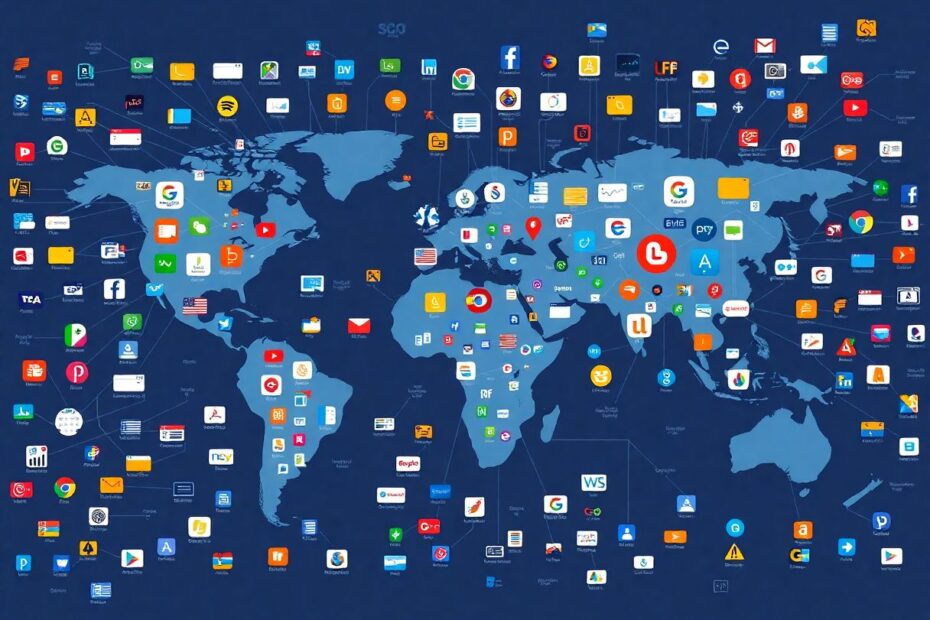In today's digital landscape, search engines have become an integral part of our daily lives. While Google reigns supreme, a vast ecosystem of alternative search engines caters to diverse needs and preferences. This comprehensive guide delves into over 250 search engines across various categories, highlighting their unique features and use cases.
The Evolution of Search
Before we explore the myriad options available, it's worth considering how search engines have evolved. The concept of information retrieval predates the internet, with early systems like DIALOG emerging in the 1960s. The World Wide Web's advent in the 1990s sparked a revolution in search technology, leading to pioneers like WebCrawler, Lycos, and AltaVista.
Google's launch in 1998 marked a turning point, introducing the PageRank algorithm that dramatically improved result relevance. Since then, search engines have continually evolved, incorporating natural language processing, machine learning, and personalization to enhance user experience.
General Purpose Search Engines
While Google dominates with over 90% market share globally, several alternatives offer unique features:
Bing, Microsoft's offering, is known for its visually appealing interface and integration with other Microsoft products. It uses the Bing Webmaster Tools to help site owners optimize their content for better visibility.
DuckDuckGo has gained popularity for its focus on privacy, not tracking user searches or personalizing results. It uses a combination of over 400 sources, including its own web crawler (DuckDuckBot), to generate results.
Yahoo! Search, one of the oldest players, is now powered by Bing but maintains its own interface and features. It still attracts millions of users, particularly those who use other Yahoo services.
Mojeek is an independent search engine that builds its own index, emphasizing unbiased results. As of 2023, it has indexed over 4 billion pages, offering a truly alternative perspective on the web.
Ecosia stands out by using its profits to plant trees. Since its inception in 2009, it has funded the planting of over 150 million trees worldwide, appealing to environmentally conscious users.
Specialized Search Engines
Beyond general-purpose tools, specialized search engines cater to specific content types or user needs:
Academic and Scientific Search
Google Scholar has become a go-to resource for academic literature, indexing over 389 million documents across various disciplines. It offers features like citation tracking and author profiles.
Scirus, before its discontinuation in 2014, focused on scientific information. Its legacy highlights the ongoing need for specialized scientific search tools.
PubMed, maintained by the U.S. National Library of Medicine, provides access to over 34 million citations for biomedical literature. It's an essential tool for medical professionals and researchers.
Visual Search
Pinterest combines visual search with social sharing, boasting over 400 million active users. Its visual discovery engine uses computer vision to identify objects in images and suggest related content.
TinEye, a reverse image search engine, has indexed over 54.7 billion images. It can find similar images or original sources, making it invaluable for tracking image usage and copyright.
Behance, part of the Adobe Creative Cloud, focuses on creative portfolios. With over 31 million members, it's a hub for discovering and showcasing artistic work.
Code and Developer Resources
GitHub, with over 83 million developers, is more than just a code repository. Its search functionality allows developers to find code snippets, projects, and collaborators across millions of repositories.
Stack Overflow, the largest developer Q&A site, has over 22 million questions and 33 million answers. Its search function helps developers find solutions to coding problems quickly.
Sourcegraph enables searching across codebases, supporting over 40 programming languages and integrating with major code hosting platforms.
Privacy-Focused Search Engines
As concerns about online privacy grow, several search engines prioritize user anonymity:
StartPage provides Google search results without tracking users, offering a proxy service for anonymous website visits.
Qwant, a European search engine, doesn't collect personal data and offers a "Qwant Junior" version designed for children's safety online.
Brave Search, built by the privacy-focused browser company, offers independent search results and has served over 12 billion queries since its launch in 2021.
The Future of Search
Emerging trends in search technology promise to reshape how we find information:
Voice Search is becoming increasingly prevalent, with over 50% of smartphone users engaging with voice technology daily. This shift requires search engines to adapt to natural language queries and provide concise, spoken responses.
Visual Search is advancing rapidly, with Google Lens processing over 3 billion searches monthly. This technology allows users to search using images instead of text, opening new possibilities for e-commerce and information discovery.
AI-Powered Search is enhancing relevance and understanding user intent. Google's BERT and MUM algorithms represent significant steps towards more nuanced language understanding in search.
Decentralized Search, leveraging blockchain technology, is exploring new models that don't rely on centralized indexes. Projects like Presearch aim to create a more open and transparent search ecosystem.
Conclusion
The landscape of search engines is diverse and ever-evolving. While Google remains dominant, the array of alternatives caters to a wide spectrum of needs, from enhanced privacy to specialized content discovery.
As we look to the future, the integration of AI, voice technology, and decentralized systems promises to make search more intuitive, accurate, and tailored to individual needs. Whether you're a casual internet user, a professional in a specialized field, or a technology enthusiast, exploring these alternatives can open up new ways of discovering and interacting with information online.
In this age of information abundance, the ability to efficiently find relevant data is more crucial than ever. By understanding and utilizing the full range of search tools available, we can navigate the digital world more effectively, unlocking new possibilities for learning, creativity, and innovation.
